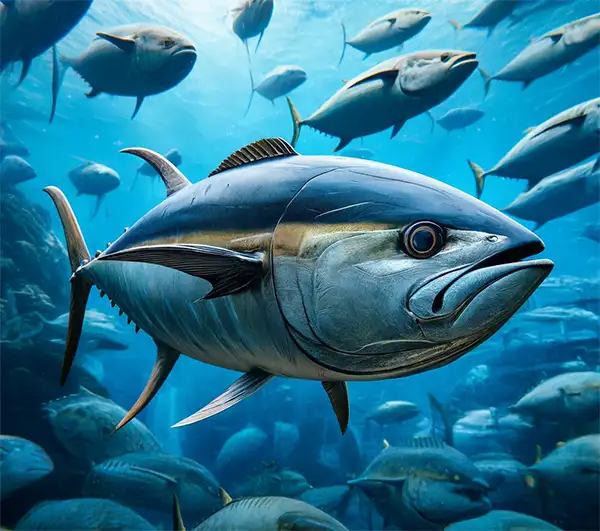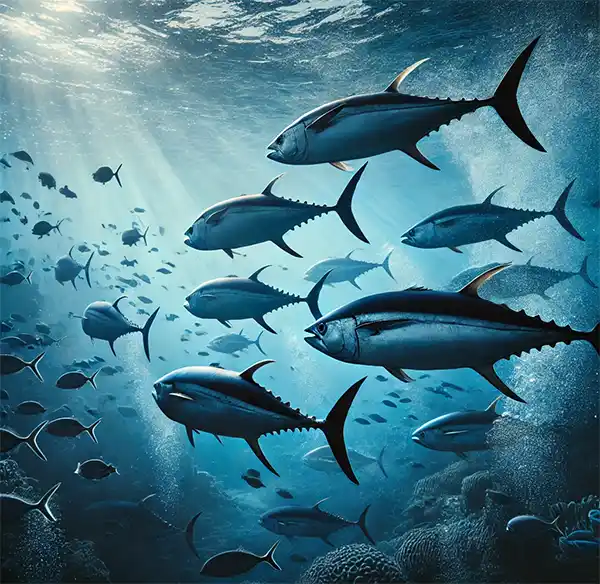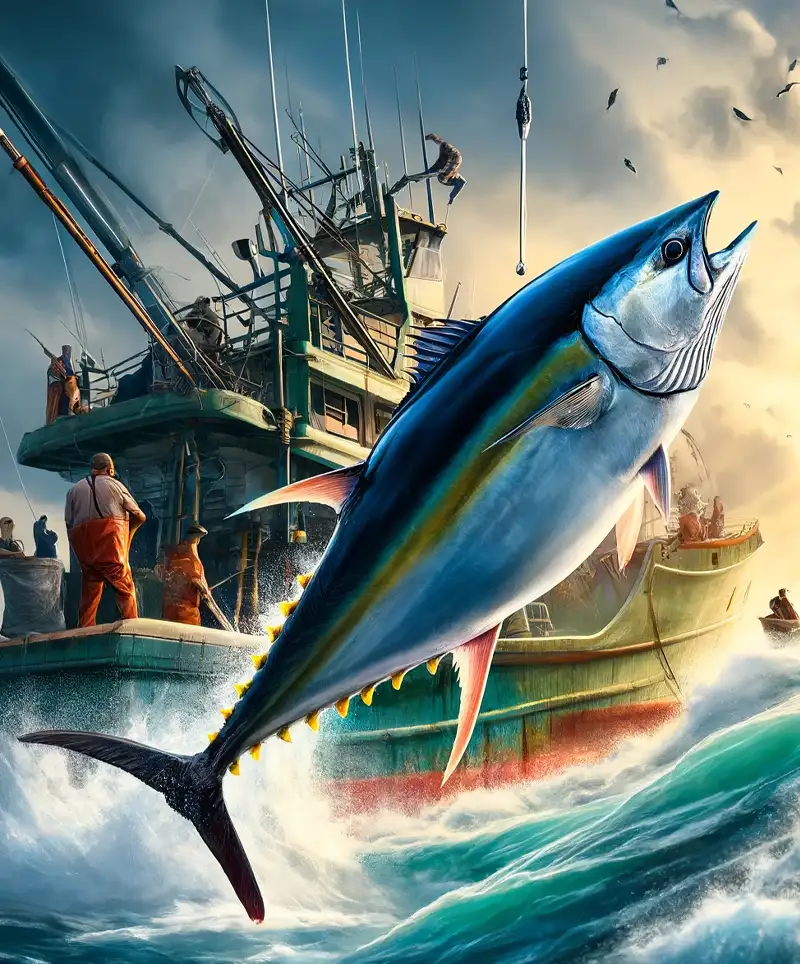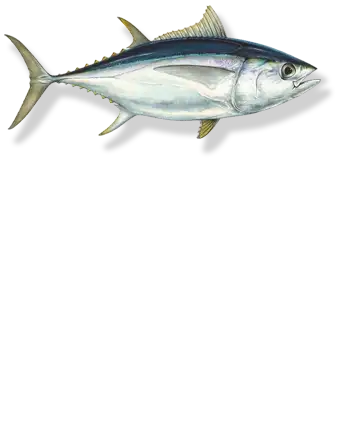
World Tuna Day, celebrated every year on May 2nd, is established by the United Nations to emphasize the critical need for sustainable fisheries management. This day serves to promote the importance of one of the most commercially valuable fishes in the world, highlighting the dual imperative of conservation and sustainable exploitation.
Significance of Tuna in Global Fisheries
Tuna species such as bluefin, yellowfin, albacore, and skipjack hold a pivotal role in the global seafood market, not just due to their popularity as a food source but also because of their economic impact. These fish are vital to commercial fisheries and are heavily consumed worldwide, making them a key component in international trade. The fishing, processing, and sale of tuna support hundreds of thousands of jobs around the world, from fishermen to retail workers.
The nutritional value of tuna also contributes to its global significance. Rich in protein, omega-3 fatty acids, and various vitamins and minerals, tuna is a healthful choice that is integral to many diets across different cultures. It is consumed in a myriad of forms, ranging from fresh sashimi to canned goods, each catering to diverse culinary traditions and consumer preferences.
However, the extensive demand for tuna has led to complex challenges in fisheries management. The high value of certain tuna species has driven intense fishing efforts, which need careful regulation to avoid over-exploitation. Sustainable management of tuna resources is crucial to ensure that this global food source remains available for future generations while also preserving the health of marine ecosystems.
World Tuna Day underscores the importance of international cooperation and sustainable practices in the fishing industry. It highlights the need for balanced approaches that consider both the economic benefits of tuna fisheries and the environmental impacts of fishing practices. Through better management, the long-term viability of tuna stocks and their continued contribution to global food security and economic stability can be secured.
Conservation Challenges
The conservation of tuna presents significant global challenges due to the migratory nature of these species, which traverse vast oceanic territories and international waters. This makes regulatory oversight complex, as it requires cooperation and agreements between multiple countries and regional fisheries management organizations. Ensuring compliance with international conservation measures is difficult, and illegal, unreported, and unregulated (IUU) fishing remains a persistent problem that undermines efforts to sustain tuna populations at healthy levels.
Additionally, the high market value of certain tuna species, especially the bluefin, has led to increased fishing pressures that often exceed sustainable limits. This is exacerbated by the use of advanced fishing technologies, such as purse seines and longlines, which can capture large numbers of tuna at once, including juvenile fish that have not yet reproduced. The bycatch of non-target species, including sea turtles, sharks, and other marine life, further complicates conservation efforts and impacts biodiversity.
Climate change also poses a new set of challenges for tuna conservation. Changing ocean temperatures and currents affect tuna migration patterns and breeding areas, which can alter their availability in traditional fishing grounds and may lead to conflicts between regional fishing fleets. Additionally, ocean acidification and deoxygenation can impact the marine food chain, affecting the prey species that tuna rely on for food.
These multifaceted challenges highlight the need for robust and adaptive management strategies that can address the current and emerging threats to tuna stocks. Conservation efforts must evolve in response to environmental changes and technological advancements in fishing to ensure the sustainable future of these vital marine resources.
How to Celebrate World Tuna Day
World Tuna Day isn’t just a day to acknowledge the importance of this remarkable fish—it’s also a chance to engage with sustainability efforts and appreciate the cultural and culinary significance of tuna worldwide. Whether you’re a seafood enthusiast, an advocate for ocean conservation, or just looking for a reason to enjoy a great meal, there are plenty of ways to participate in this global observance.
- Eat Sustainably – Enjoy a tuna dish while making eco-conscious choices. Look for labels such as the Marine Stewardship Council (MSC) certification, which ensures the fish was caught using sustainable practices. Trying alternatives like pole-and-line-caught or handline tuna helps reduce overfishing and bycatch.
- Try a New Tuna Recipe – Tuna is incredibly versatile in the kitchen. Celebrate by preparing a dish that highlights its flavor, whether it’s a classic tuna tartare, a fresh poke bowl, or a traditional niçoise salad.
- Support Conservation Efforts – Many organizations work tirelessly to protect marine ecosystems and ensure the sustainable management of tuna fisheries. Consider donating to or volunteering with groups that advocate for responsible fishing practices.
- Educate Yourself and Others – Share information about tuna sustainability on social media or host a discussion with friends and family about the importance of responsible seafood consumption.
- Participate in Local Events – Some coastal communities, restaurants, and conservation groups host World Tuna Day activities, such as seafood festivals, cooking demonstrations, or educational workshops. These events offer a fun and engaging way to learn about the impact of tuna on our oceans and economies.
By celebrating responsibly, we contribute to the ongoing efforts to protect tuna populations and ensure they remain a vital part of marine ecosystems and global diets for generations to come.

Fun Facts About Tuna
Tuna is more than just a tasty seafood staple—it’s a fascinating species with some surprising characteristics. Here are some interesting facts that showcase just how remarkable these fish really are:
- Tuna Never Stop Moving – Unlike most fish, tuna must constantly swim to keep oxygen-rich water flowing over their gills. If they stop, they can suffocate!
- Speed Demons of the Sea – Some species of tuna, like the yellowfin, can reach speeds of up to 50 miles per hour, making them one of the fastest fish in the ocean.
- They Travel the World – Tuna are highly migratory and can cross entire ocean basins. A single bluefin tuna can travel thousands of miles in just a few months.
- Priced Like Gold – Bluefin tuna is one of the most expensive fish in the world. In Japan, a single bluefin has been auctioned for over $3 million due to its prized quality for sushi.
- Warm-Blooded Fish? – Most fish are cold-blooded, but some tuna species, like the bluefin, can regulate their body temperature. This adaptation allows them to thrive in a range of oceanic environments.
- They Get Huge – Bluefin tuna can grow over 10 feet in length and weigh more than 1,500 pounds—roughly the size of a small car!
- Tuna Has Been Eaten for Centuries – Evidence suggests that ancient civilizations, including the Greeks and Romans, were catching and enjoying tuna thousands of years ago.
- Not Just Food, But Prey – Despite their size and speed, tuna aren’t at the top of the oceanic food chain. They are prey for even bigger marine predators like sharks and killer whales.
Tuna is an extraordinary fish with a critical role in both marine ecosystems and global cuisine. World Tuna Day serves as a reminder of the importance of conserving these incredible creatures while appreciating their cultural and economic significance.
Efforts Toward Sustainable Fishing
World Tuna Day encourages the support of international and regional organizations such as the International Commission for the Conservation of Atlantic Tunas (ICCAT) and the Western and Central Pacific Fisheries Commission (WCPFC). These bodies are crucial in managing tuna resources, setting quotas, and conducting scientific research to inform policy decisions. Their work helps to balance tuna harvesting with ecological sustainability.
For many coastal and island communities, especially in developing countries, tuna fishing is a critical economic activity. These communities depend heavily on tuna resources for both food and employment. Sustainable fishing practices are thus essential not only for environmental reasons but also for the economic well-being of millions of people worldwide.
Promoting Consumer Awareness
World Tuna Day also focuses on educating consumers about the environmental impacts of tuna fishing. Conservation organizations advocate for informed choices regarding seafood consumption, promoting products that are certified as sustainably harvested. These efforts aim to reduce the pressure on tuna populations and ensure long-term sustainability.
World Tuna Day serves as a reminder of the delicate balance required to utilize natural resources responsibly. It is a call to action for everyone involved, from policymakers to consumers, to adopt and support fishing practices that ensure the viability of tuna populations for future generations. Celebrating this day underscores the collective responsibility to preserve marine life and maintain the health of our oceans.
Please Share our Content

















 "Sláinte!" is a traditional Irish expression used as a toast, equivalent to "Cheers!" in English.
"Sláinte!" is a traditional Irish expression used as a toast, equivalent to "Cheers!" in English.